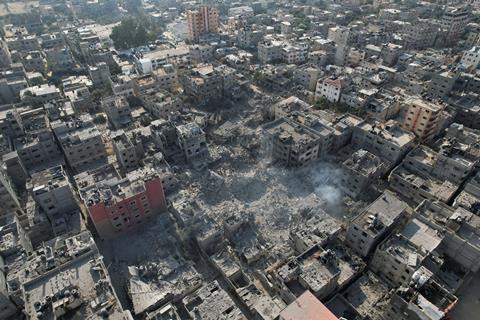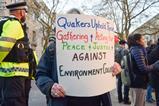Symon Hill explains why he’s joining calls for a ceasefire

“Where is God?”. It is a question asked by many people watching the horrifying events in Israel and Palestine.
Munther Isaac, Pastor of the Evangelical Lutheran Church in Bethlehem, offers an insightful answer: “God is under the rubble in Gaza”.
God is with those who are suffering, siding with the victims, the dying, the traumatised - whatever their nationality.
Jesus told his most famous parable in response to the question, “Who is my neighbour?”. The Samaritan was a neighbour to the Israelite attacked on the road (Luke 10:25-37). I have been asked whose “side” I am on. I think we should all be on the side of innocent children who have been killed, and their traumatised families. This means opposing their killers – whether Hamas or the Israeli military. It means siding with the many Palestinians and Israelis who are working for peace.
“Both Hamas and Israel are treating civilians as insignificant,” writes Richard Sewell, Dean of St George’s Anglican College in Jerusalem. The Orthodox Church in Jerusalem pointed out last week that “the Israeli military has targeted 19 places of worship, including mosques and churches, in Gaza during the past three weeks.”
Nearly all Christian leaders in Palestine and Israel are demanding a ceasefire. “The call for a ceasefire comes from the simple fact that we are pro-life,” writes Palestinian Christian journalist Daoud Kuttab.
Some argue that a ceasefire would allow Hamas to prepare further violence. This overlooks the reality that the Israeli military are committing atrocities. The more they do this, the more Hamas can gain support by presenting themselves as defenders against aggression.
As Christians who value all life, let us call for a ceasefire as a vital step in a longer journey of peace, justice and reconciliation. This should go along with a demand for the release of hostages by Hamas and political prisoners in Israel (including conscientious objectors). And we must be very active in resisting anti-Semitism and Islamophobia on our own streets.
Evangelical organisations from various parts of Asia and Africa have published a joint statement calling for a ceasefire. Twenty Christian leaders in the UK recently signed a Christian Aid statement backing an immediate ceasefire. They include the Moderator of the Church of Scotland, the President of the Methodist Church, the General Secretary of the Baptist Union of Wales and the Primus of the Scottish Episcopal Church, along with Quaker, Pentecostal and United Reformed Church leaders.
The Archbishops of Canterbury and York are absent from the list of signatories, as are British Roman Catholic leaders.
Justin Welby has issued heartfelt pleas for humanitarian aid but has not condemned Israeli attacks. The Church of England has now produced a staggeringly one-sided statement on the war. They rightly condemn Hamas and their indiscriminate killings. They then add, “We must also reflect on the actions that Israel has taken in response”. Condemnation for the atrocities of one group, “reflection” for the atrocities of another. This is an outrageous case of double standards.
Like many Palestinian Christians, Munther Isaac expressed his dismay with the Church of England statement for “only shyly mentioning” Israeli war crimes. Last week, a group of Palestinian Christian theologians urged Western church leaders to “repent” of their failure to challenge Israeli military aggression in Palestine. Church leaders who have rightly condemned Russian atrocities in Ukraine are failing to oppose similar atrocities in Gaza.
Condemnation of indiscriminate killing is meaningless if it does not apply to all indiscriminate killing. Love of neighbour is undermined if we love only neighbours on one side. Calls for aid are feeble if they rely on a “humanitarian pause” followed by a continuation of the killing.
Hundreds of thousands of people are marching in British cities calling for a ceasefire. Despite Home Secretary Suella Braverman’s ludicrous description of such demonstrations as “hate marches”, the vast majority of participants strongly oppose Hamas and anti-Semitism. There have been several Jewish-led protests calling for a ceasefire. To assume that all Jews support the Israeli government is to view Jews as an homogenous unthinking mass. It is assumptions such as this that are truly anti-Semitic.
These protests have thankfully included Christian peace groups such as the Fellowship of Reconciliation and Cymdeithas y Cymod. But imagine if they included speeches by Christian leaders proclaiming that all human lives are valued in the Kingdom of God and that God is “in the rubble” with people who are suffering. It would be an act of practical service, as well as a powerful witness to Christ.
If there is a peace vigil or ceasefire demonstration in your area, why not contact the organisers and ask how your church can play a part? Perhaps you could join a march with a church banner, or offer practical assistance by making tea and coffee for the participants. If national church leaders fail to take the lead, Christians at the grassroots can show the way.






































No comments yet